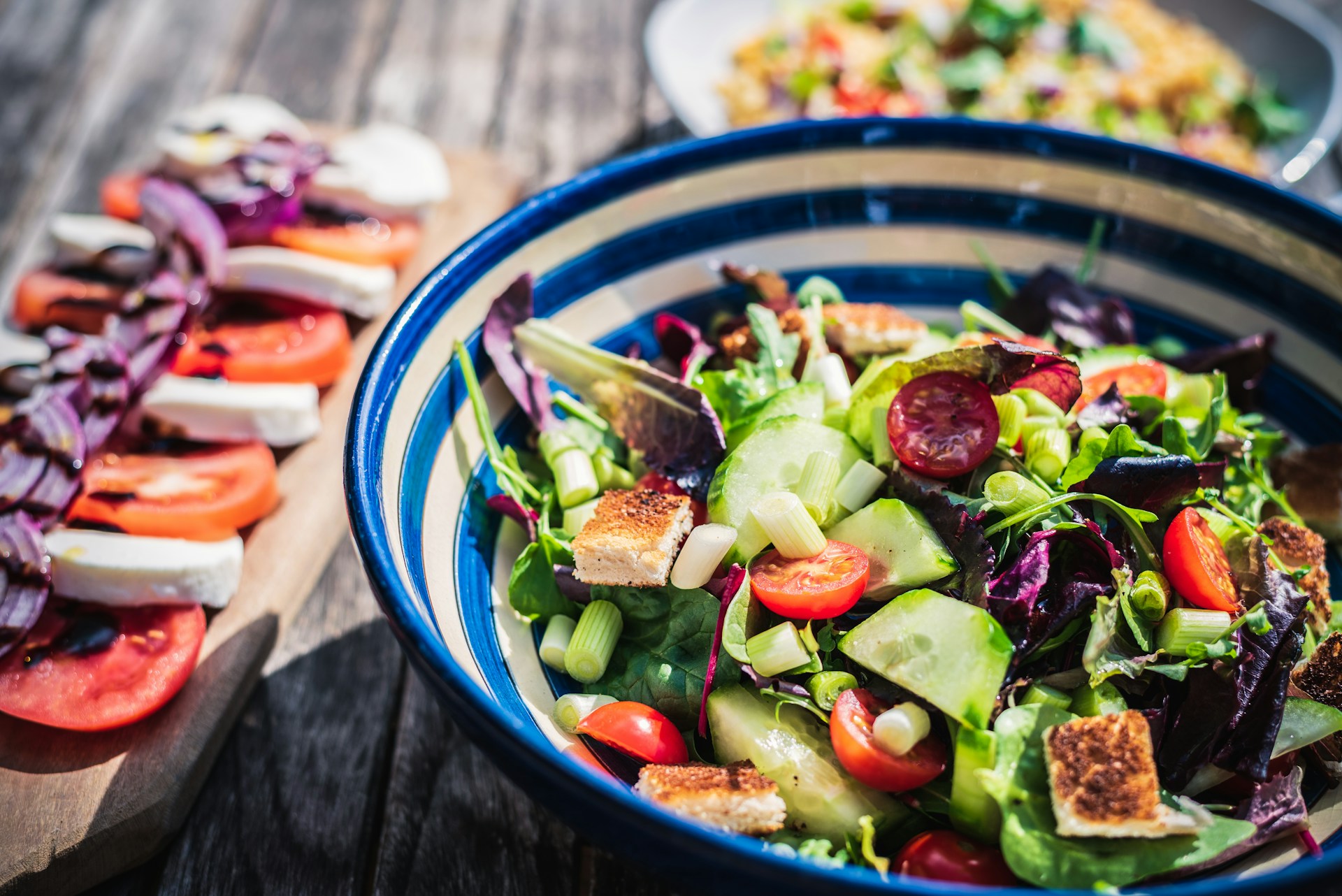Introduction
The Mediterranean diet, often hailed as one of the healthiest eating patterns, is more than just a diet; it’s a lifestyle embraced by people living along the Mediterranean Sea. This diet is renowned for its association with a long life expectancy and lower rates of chronic diseases. The essence of this diet lies in its simplicity and variety, focusing on whole foods and fresh ingredients.
At the heart of the Mediterranean diet is breakfast, which sets the tone for the day with a meal that is both nourishing and satisfying. Unlike the typical Western breakfast that often relies heavily on processed foods and sugars, a Mediterranean breakfast is a harmonious blend of flavors, colors, and nutrients, providing a balanced start to the day.
A traditional Mediterranean breakfast is a colorful spread that includes a variety of foods rich in fiber, vitamins, and minerals. Whole grains, fresh fruits, vegetables, healthy fats like olive oil, and lean proteins are the cornerstones of this meal. It’s common to see whole-grain bread, fresh tomatoes, cucumbers, olives, and a drizzle of olive oil accompanied by a cup of herbal tea or coffee.
The Mediterranean diet breakfast is not just about the food; it’s also about the approach to eating. Meals are often enjoyed slowly, with an emphasis on savoring the flavors and enjoying the company of family and friends. This mindful approach to eating is thought to contribute to the overall health benefits of the diet.
In the following sections, we will delve deeper into the core elements of a Mediterranean diet breakfast, explore traditional foods from various regions, and provide practical ideas for incorporating these principles into your daily routine. Whether you’re looking for a quick weekday meal or a leisurely weekend brunch, the Mediterranean diet offers a wealth of options to start your day in a healthy, delicious way.
The Core Elements of a Mediterranean Breakfast
A Mediterranean breakfast is a testament to the diet’s philosophy: fresh, whole foods prepared simply yet deliciously. It’s a meal that energizes the body, delights the senses and sets a positive tone for the day’s eating. Here are the core elements that make up this vital morning meal:
- Whole Grains: The foundation of a Mediterranean breakfast often starts with whole grains. These are not your average refined cereals or white breads but hearty, fiber-rich foods that provide sustained energy. Think of toasted whole-grain bread, often topped with a drizzle of olive oil or a spread of soft cheese. In some regions, grains like couscous or bulgur may be prepared as a savory porridge, occasionally sweetened with a touch of honey and nuts.
- Fresh Fruits and Vegetables: A burst of color on the plate, fresh fruits, and vegetables are indispensable in a Mediterranean breakfast. They’re not just garnishes but central components. Tomatoes, cucumbers, olives, and a variety of greens can turn a simple meal into a feast for the eyes and the body, providing essential vitamins and minerals.
- Healthy Fats: Olive oil is the star here, used liberally but wisely to bring out the flavor of foods and add its own subtle, fruity notes. It’s not just about taste; olive oil is also packed with monounsaturated fats, which are good for heart health. Nuts and seeds also contribute healthy fats and a satisfying crunch to the meal.
- Protein: While not always the centerpiece, protein plays a crucial role in a Mediterranean breakfast. It might come from plant-based sources like legumes and beans, or dairy products such as Greek yogurt and a variety of cheeses. Eggs are also a common feature, whether boiled, poached, or prepared as part of a dish like shakshuka, which includes poached eggs in a spicy tomato sauce.
- Balance and Moderation: A Mediterranean breakfast is all about balance. It’s not overly heavy or light but strikes the right note to satisfy hunger without leading to sluggishness. Portions are moderate, ensuring that each element of the meal is enjoyed in the right quantity.
- Flavors and Nutrients: The Mediterranean diet is rich in nutrients, and breakfast is no exception. Each element of the meal contributes to a nutritional profile that supports overall health, including heart health, weight management, and more. The flavors are natural and vibrant, often enhanced with herbs and spices like za’atar, a blend of Mediterranean wild thyme, and toasted sesame seeds.
In essence, a Mediterranean breakfast is a harmonious blend of textures, flavors, and nutrients that reflect the diversity and healthfulness of the Mediterranean diet. It’s a meal that can be enjoyed quickly on a busy morning or savored slowly on a leisurely day, always leaving you nourished and ready to face the day.
Traditional Mediterranean Breakfast Foods
The Mediterranean diet is celebrated for its diverse and flavorful breakfast options, which vary across different regions but share common healthful ingredients. Here’s a closer look at some traditional foods that grace the breakfast tables in Mediterranean countries:
- Pan Con Tomate (Spain): A simple yet beloved dish, pan con tomate is a staple in Spanish homes. It consists of toasted bread rubbed with garlic and ripe tomatoes, then drizzled with olive oil and sprinkled with a pinch of salt. This dish captures the essence of Mediterranean flavors—fresh, vibrant, and straightforward.
- Greek Omelette with Zucchini and Mint (Crete): In Crete, a light and flavorful omelet made with fresh zucchini and mint is a common breakfast item. It reflects the Cretan love for fresh vegetables and herbs, combined with the protein-rich goodness of eggs.
- Foul Muddamas (Egypt): This hearty fava bean porridge is a traditional Egyptian breakfast. Slow-cooked overnight, it’s often served with fresh vegetables like tomatoes and cucumbers. Foul Muddamas is not only filling but also packed with protein and fiber.
- Shakshuka (North Africa and Middle East): A dish that has gained international fame, shakshuka features poached eggs in a spicy tomato and pepper sauce. It’s a warming and satisfying meal that’s perfect for starting the day with a kick.
- Labneh and Hummus (Eastern Mediterranean): Creamy labneh (strained yogurt) and homemade hummus often find their way to the breakfast table, served with warm pita bread. They’re typically enjoyed with a drizzle of olive oil and a sprinkle of za’atar, a blend of Mediterranean wild thyme, and toasted sesame seeds.
- Fresh Fruits and Nuts: No Mediterranean breakfast is complete without fresh fruits like figs, oranges, and grapes, often accompanied by a selection of nuts. These provide a sweet balance to the savory dishes and add a variety of textures and flavors.
- Whole Grain Cereals: Grains like oats, barley, and couscous are commonly used in Mediterranean breakfast cereals. They might be enjoyed as savory porridge or sweetened with a touch of honey and topped with nuts for added crunch.
- Yogurt: Greek yogurt, known for its creaminess and high protein content, is a common feature in Mediterranean breakfasts. It can be enjoyed plain, with honey, or as part of a more elaborate dish.
These foods not only offer a delicious start to the day but also embody the Mediterranean diet’s principles of health and balance. Each item is chosen for its nutritional value, taste, and the role it plays in creating a well-rounded meal that satisfies the palate and nourishes the body. Incorporating these traditional Mediterranean breakfast foods into your morning routine can be a delightful and healthful way to embrace the Mediterranean lifestyle.
Quick and Easy Mediterranean Breakfast Ideas
In the fast-paced rhythm of modern life, having quick and easy breakfast options is essential. The Mediterranean diet offers a variety of simple yet nutritious choices that can be prepared in a matter of minutes. Here are some ideas to help you enjoy a Mediterranean-style breakfast, even on your busiest mornings:
- Greek Yogurt with Honey and Nuts: Start your day with a bowl of thick Greek yogurt, drizzled with honey and sprinkled with a mix of nuts like almonds, walnuts, or pistachios. This combination provides protein, healthy fats, and a touch of sweetness to satisfy your morning hunger.
- Whole Grain Toast with Avocado and Tomato: Toast a slice of whole grain bread and top it with mashed avocado and sliced tomato. Season with a pinch of salt, pepper, and a squeeze of lemon for an extra zing. This breakfast is not only quick to prepare but also packed with heart-healthy fats and fiber.
- Oatmeal with Fresh Fruit: Prepare a warm bowl of oatmeal and top it with your choice of fresh fruits such as berries, sliced bananas, or figs. Add a sprinkle of cinnamon or a few drops of vanilla extract for added flavor without extra sugar.
- Frittata Muffins: Whisk together eggs, chopped vegetables, and a bit of feta cheese, then pour the mixture into muffin tins and bake. These frittata muffins can be made ahead of time and enjoyed throughout the week for a protein-rich grab-and-go option.
- Smoothie with Spinach, Banana, and Flaxseed: Blend a handful of spinach, a ripe banana, a tablespoon of ground flaxseed, and a cup of almond milk for a quick and energizing smoothie. This drink is a great way to get in some greens first thing in the morning.
- Overnight Oats: Mix rolled oats with Greek yogurt, a bit of milk, and your favorite fruits and nuts. Let it sit in the fridge overnight, and you’ll have a creamy and satisfying breakfast waiting for you in the morning.
- Hummus and Veggie Wrap: Spread hummus on a whole grain wrap and fill it with sliced cucumbers, bell peppers, and arugula. Roll it up for a portable and fiber-rich breakfast that you can eat on the go.
These ideas are just a starting point. The beauty of the Mediterranean diet is its flexibility and emphasis on using fresh, whole ingredients. Feel free to get creative and tailor these suggestions to suit your taste preferences and dietary needs. Enjoying a Mediterranean breakfast is a delightful way to nourish your body and start your day on a positive note.
Leisurely Mediterranean Breakfasts
Weekends and holidays in the Mediterranean region are times for relaxation and family gatherings, often centered around food. A leisurely Mediterranean breakfast or brunch is a perfect example of this tradition, where the pace is slow, the table is abundant, and the conversation flows as freely as the coffee. Here’s what you might expect from a leisurely Mediterranean breakfast:
- A variety of breads, cheeses, and charcuterie.
- Olives, pickles, and other marinated vegetables.
- Fresh vegetables and fruits.
- Eggs in many forms, such as boiled, shakshuka, or omelets.
- Yogurt and honey.
- Coffee and tea.
- Sweet pastries like baklava.
A leisurely Mediterranean breakfast is about indulgence, taking the time to enjoy each dish and the company of loved ones. It’s a celebration of food and life, a time to relax and recharge before the week ahead. Whether you’re enjoying a simple meal of bread and cheese or a full spread with every imaginable dish, the key is to savor each bite and enjoy the moment.
Health Benefits
The Mediterranean diet, particularly its approach to breakfast, is associated with a myriad of health benefits that extend far beyond the morning meal. Here are some of the key health advantages of starting your day with a Mediterranean diet breakfast:
- Cardiovascular health improvements.
- Weight management through high fiber and protein content.
- Reduced risk of chronic diseases like cancer and diabetes.
- Neuroprotective effects and cognitive function support.
- Enhanced gut health and immune system.
- Increased longevity and overall well-being.
- Anti-inflammatory properties.
- Social enjoyment and cultural significance.
Incorporating a Mediterranean diet breakfast into your daily routine can be a delicious and effective way to improve your health and start your day on a positive note. With its focus on fresh, whole foods and a balanced intake of nutrients, it’s a lifestyle choice that pays dividends in both the short and long term.
Adapting to Local Tastes
Embracing the Mediterranean diet doesn’t mean you have to give up your local culinary traditions. The diet’s principles can be adapted to fit any cultural context, allowing you to enjoy the health benefits while savoring the flavors you love. Here’s how you can adapt the Mediterranean diet breakfast to local tastes:
- Use local ingredients and incorporate traditional spices and herbs.
- Modify cooking methods to suit local practices.
- Substitute similar textures and flavors with local items.
- Balance the diet with local dietary practices.
- Maintain the core principles of the Mediterranean diet.
- Experiment with fusion recipes.
- Educate and share your adaptations and experiences.
By adapting the Mediterranean diet to local tastes, you can enjoy a breakfast that’s both familiar and healthful, providing a delightful start to your day that’s rooted in your culinary heritage while embracing a global perspective on wellness.
Conclusion
As we wrap up our exploration of the Mediterranean diet breakfast, it’s clear that this isn’t just a meal but a gateway to a healthier lifestyle. The Mediterranean diet is more than a list of foods; it’s a cultural heritage that offers a time-tested blueprint for well-being. Here are the key takeaways from our journey through the Mediterranean morning:
- A nutrient-dense start to the day.
- Benefits for heart health and weight management.
- Reduced risk of chronic diseases and support for cognitive function.
- Cultural and social enjoyment.
- Flexibility and adaptability to local tastes.
- A sustainable choice for personal and planetary health.
In conclusion, adopting a Mediterranean diet breakfast is a delicious and healthful choice that aligns with a holistic approach to eating and living. It’s a celebration of flavor, nutrition, and tradition that can enrich your life in countless ways. Whether you’re looking for a quick weekday meal or a leisurely weekend feast, the Mediterranean diet offers a variety of options to suit any taste and lifestyle. Embrace the Mediterranean way, and you may find yourself on a path to a longer, healthier, and happier life.
Check out more articles!









One response to “Mediterranean Diet Breakfasts: Nourishing Recipes for a Heart-Healthy Morning”
[…] many individuals do not follow the Mediterranean diet in their daily lives due to factors such as lack of time, culinary skills, or access to fresh […]